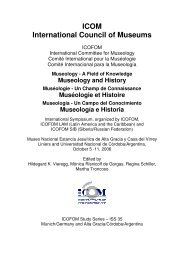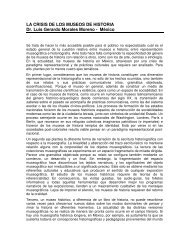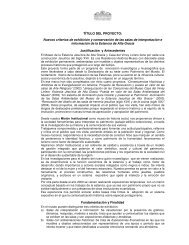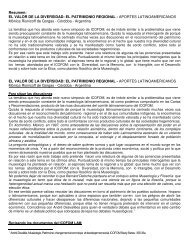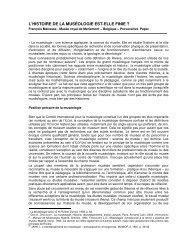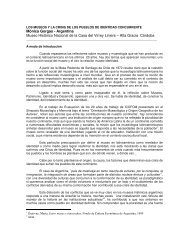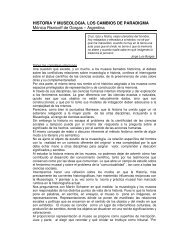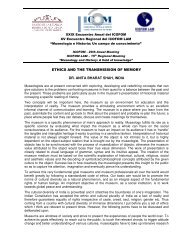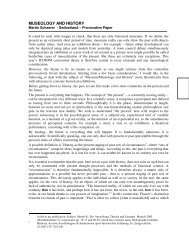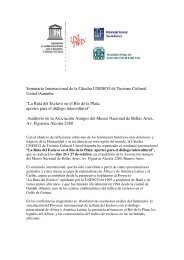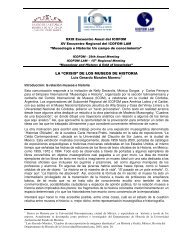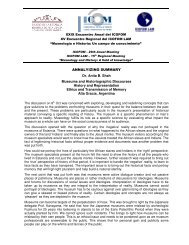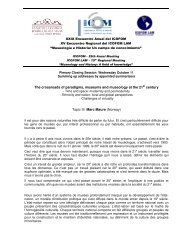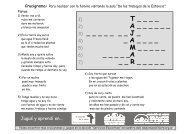MUSEOLOGY AND THE INTERPRETATION OF REALITY: THE ...
MUSEOLOGY AND THE INTERPRETATION OF REALITY: THE ...
MUSEOLOGY AND THE INTERPRETATION OF REALITY: THE ...
- No tags were found...
Create successful ePaper yourself
Turn your PDF publications into a flip-book with our unique Google optimized e-Paper software.
limits of written or oral language; but it may be frequently built as museological language,and represented, in most cases, under the form of exhibitions.In all those alternatives, it would be useful to analyze which perception of factsand actors of History museums allow, and which narratives they develop. In the presenttimes, many museums tend to project themselves beyond formal narratives, presentingan enacted re-creation of historic and/or natural facts, in spaces consecrated by theirpatrimonial (heritage) value. In such theatrical narratives, places and objects mayfunction as scenic spaces. In some cases, visitors are incorporated as actors, inexperiences that build a bridge between different spatialities, or between differenttemporalities, offering a fascinating sensation: that of being in the place of the Other,assuming, even for a short moment, another identity.2. MUSEUM <strong>AND</strong> IDENTITYTo offer to the visitor the experience of being the Other: that is a fascinatingexperience to museological narrative. We know that museums have always been relatedto the perception of identity (or identities, as we could now consider). And, althoughidentity may be conceived, in the theoretical sphere, as a permanent value, in practice itis always constituted in process, as the result of a permanent re-ordination of traits,multifaceted kaleidoscope of infinite – tangible and intangible – fragments of reality.How to approach the relationship between museums and identities? Although thetheme must be approached historically, we must also understand identity beyondhistory, looking for signs of its presence as mark of Tradition, form of art, poeticmovement or perceptual context. That is, trying to understand identity as a complex ofindividualities, where the id of each trait unveils, in all its significance.Contemporary society develops a strong, continuous public debate about thetheme of identity: it is treated in several fields of knowledge in an almost obsessive form –as if talking about an aspect of reality could guarantee, by proximity, its unveiling. Socioanalysisshows that such interest is related to the collapse of the ‘welfare State’ 13 and tothe emptiness of democratic institutions, consequential effects of a globalization processthat leaves us at drift, in a world where nothing more is secure, certain, or expected – andwhere the social links are re-shaped and re-signified, in continuous process. In suchenvironment, all that we aspire for is to return to the protected, familiar sphere of normsand traditions, that (we imagine) would save us from the uncertainties and theimponderable, offering a suitable alternative for the evils of a globalized world, whereeverything seems to be mediated by technique – from the great global decisions in thepolitical field to kinship and neighborhood relationships.The policies on identities speak, above all, the language of the excluded, of thosewho stand at the margins of the globalization process; or those who try to redefine andreinvent their own history, linking nostalgia for the past to the fugacity of the culturalprocesses of the present. In such process, we tend to forget that identities represent, onone side, ‘a socially necessary convention’ 14 , that allows us to transfer to the political planthe complex of individual perceptions about what signifies our selves; and on the other,the sum of traits and tendencies which characterize individual or group authenticity, in itscore.13 VECCHI, Benedetto. Introduction (Introdução). In: BAUMAN, Z. Identity: interview with Benedetto Vecchi. (Identidade:entrevista a Benedetto Vecchi). Trad. Carlos Alberto Medeiros. RJ: Zahar, 2005. p. 1114 Ibid., p. 135



